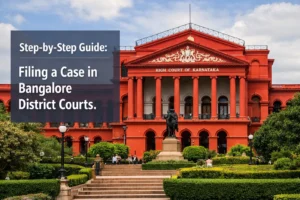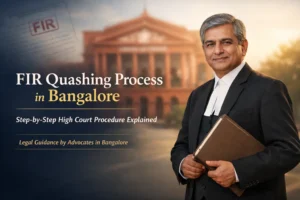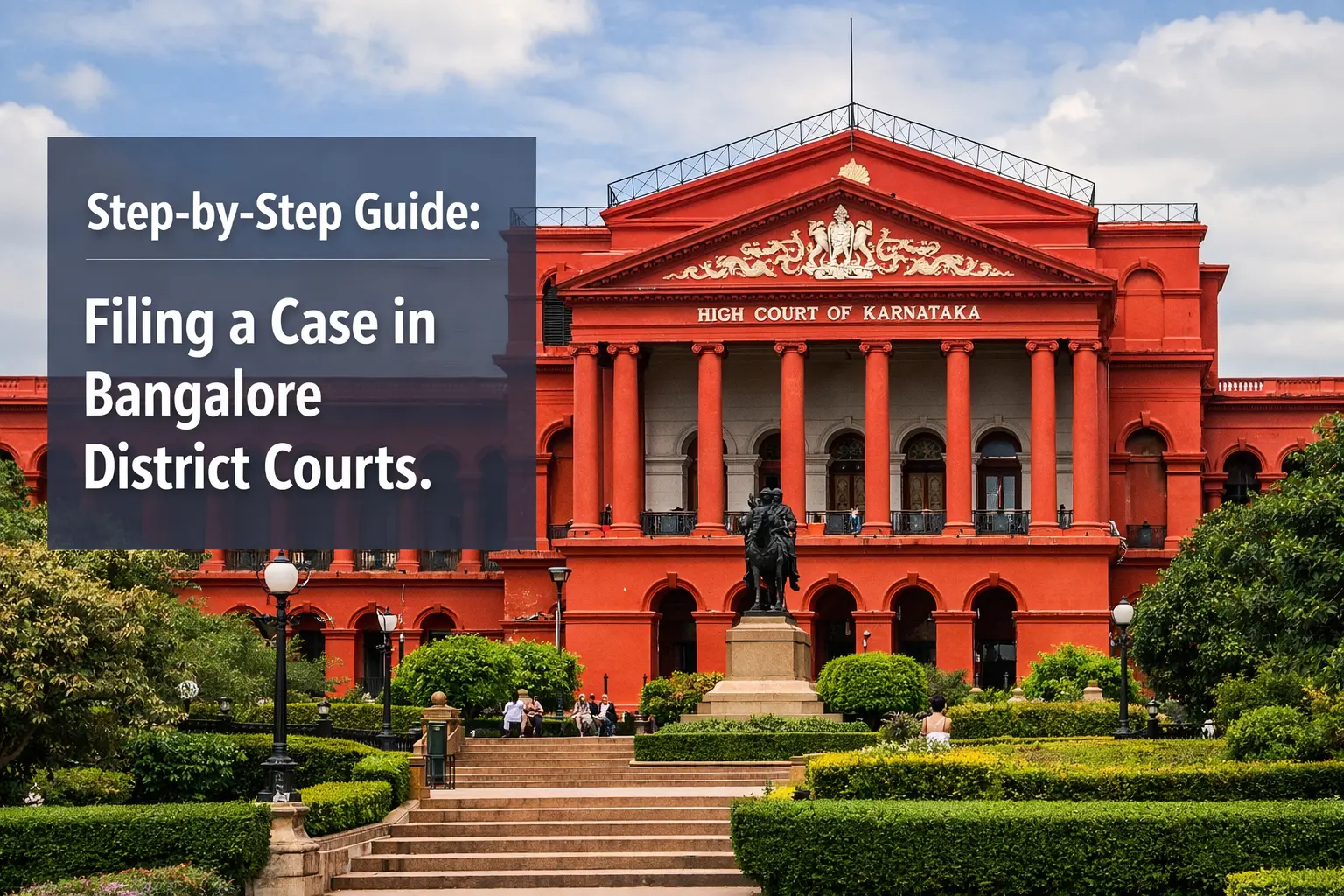The legal landscape in India, and consequently in Karnataka, is undergoing a monumental transformation. Understanding the recent Criminal Law Amendments Karnataka is not just crucial for legal professionals but for every citizen and business operating within the state.
The introduction of three new foundational criminal laws marks a significant departure from the colonial-era statutes that governed India for over a century. This shift aims to modernize the justice system, prioritize victims, leverage technology, and improve procedural efficiency.
But what exactly are these changes, and how do they impact you here in Bengaluru and across Karnataka?
This comprehensive guide, brought to you by Kumar & Anjan Kumar Associates, your trusted partners for legal services in Bengaluru, Karnataka, aims to demystify these significant updates.
We understand that legal changes can seem daunting. Whether you need assistance with Criminal Law in Bangalore, require an Anticipatory Bail lawyer in Bangalore, or seek representation from a High Court Lawyer in Bangalore, navigating the new framework requires clarity and expertise.
Let’s dive into the essentials of these new criminal laws in Karnataka. The Criminal Law Amendments Karnataka represent a pivotal moment, and being informed is the first step towards ensuring your rights are protected.
Why the Overhaul? Understanding the Need for Recent Criminal Law Updates Karnataka
You might be wondering, why fix what wasn’t entirely broken? Well, the Indian Penal Code (IPC) of 1860, the Code of Criminal Procedure (CrPC) of 1973, and the Indian Evidence Act of 1872, while foundational, were products of a different era.
Over the decades, societal norms, technological advancements, and the very nature of crime have evolved dramatically. The previous laws often faced criticism for being archaic, overly complex, and sometimes, not adequately addressing the needs of victims or the challenges of modern investigations.
The recent criminal law updates Karnataka inherit from the national push address these gaps.
The primary motivation behind this massive legislative overhaul was to:
- Modernize: Align the laws with contemporary India and current global legal standards.
- Simplify: Make procedures clearer and potentially faster.
- Victim-Centric Approach: Enhance protections and participation for victims of crime.
- Technology Integration: Formally incorporate electronic and digital evidence and procedures.
- Efficiency: Streamline investigation and trial processes to reduce delays.
These Karnataka criminal law changes are designed, in principle, to create a more responsive, efficient, and just criminal justice system for everyone, from Electronic City to Indiranagar.
Meet the New Trio: Replacing IPC, CrPC, and Evidence Act
The cornerstone of the Criminal Law Amendments Karnataka lies in the replacement of three fundamental laws with new Acts passed by the Indian Parliament, which apply nationwide, including Karnataka:
- The Bharatiya Nyaya Sanhita (BNS), 2023: This act replaces the Indian Penal Code (IPC), 1860. It defines various offences and prescribes punishments.
- The Bharatiya Nagarik Suraksha Sanhita (BNSS), 2023: This act replaces the Code of Criminal Procedure (CrPC), 1973. It lays down the procedures for investigation, arrest, prosecution, and trial.
- The Bharatiya Sakshya Adhiniyam (BSA), 2023: This act replaces the Indian Evidence Act, 1872. It governs the rules concerning the admissibility and evaluation of evidence in court proceedings.
Understanding these three pillars – the Bharatiya Nyaya Sanhita Karnataka, Bharatiya Nagarik Suraksha Sanhita Karnataka, and Bharatiya Sakshya Adhiniyam Karnataka – is key to grasping the scope of the amendment to IPC Karnataka and the amendment to CrPC Karnataka. While the core principles of criminal jurisprudence remain, the definitions, procedures, and rules of evidence have seen significant updates.
Decoding the Bharatiya Nyaya Sanhita (BNS) 2023: Key Changes Affecting Karnataka
The BNS, replacing the IPC, isn’t just a renaming exercise. It introduces substantial changes, impacting how crimes are defined and punished in Karnataka. Some key highlights include:
- New Offences: Introduces specific offences like terrorism, organised crime, and acts endangering sovereignty, unity, and integrity of India with detailed definitions.
- Definition Modifications: Some existing offences have modified definitions or penalties. For example, ‘sedition’ (formerly IPC Section 124A) is repealed and replaced with a new provision under endangering sovereignty.
- Community Service: Introduces community service as a form of punishment for certain minor offences, offering an alternative to imprisonment or fines.
- Focus on Women and Children: Includes enhanced punishments for crimes against women and children.
- Repeal of Obsolete Offences: Removes certain outdated offences from the statute books.
For individuals and businesses in Karnataka, these changes mean that activities previously covered under the IPC are now governed by the BNS. Understanding these nuances is vital, especially when dealing with Criminal Law in Bangalore. For instance, the new definitions of organised crime could impact business disputes or alleged economic offences differently. Consulting an experienced criminal lawyer in Bangalore is crucial to understand how the Bharatiya Nyaya Sanhita Karnataka applies to specific situations.
The Bharatiya Nagarik Suraksha Sanhita (BNSS) 2023: Impact on Karnataka Criminal Procedure Code Amendment
Procedural law dictates how the criminal justice system operates. The BNSS, replacing the CrPC, brings significant procedural shifts impacting everything from police investigations to court trials across Karnataka. Key aspects of the Bharatiya Nagarik Suraksha Sanhita Karnataka include:
- Mandatory Videography: Requires videography during search and seizure operations, potentially increasing transparency.
- Electronic FIRs: Allows for the registration of First Information Reports (FIRs) electronically (e-FIRs).
- Time-Bound Processes: Stipulates stricter timelines for various stages, including investigation completion, charge-sheet filing, and judgment delivery, aiming to expedite cases.
- Police Custody Rules: The rules regarding the duration and conditions of police custody see modifications. The BNSS potentially allows for the 15-day police custody period to be sought in parts across the initial 40 or 60 days of detention, differing from the earlier continuous period rule post-arrest. This police custody duration Karnataka amendments aspect requires careful legal interpretation.
- Attachment of Property: Provisions related to the attachment of property by police, particularly proceeds of crime, are defined, giving potentially clearer powers to authorities under specific circumstances.
- Trials in Absentia: Allows for trials to proceed and judgments to be pronounced even if the accused is absconding.
These Karnataka criminal procedure code amendment effects mean interactions with the police and courts will follow new protocols. Whether you’re in JP Nagar or HSR Layout, knowing these procedural rights and obligations under BNSS is essential. The changes concerning attachment of property by police Karnataka could have significant financial implications.
Embracing the Digital Age: The Bharatiya Sakshya Adhiniyam (BSA) 2023 and Evidence in Karnataka
In today’s world, evidence is increasingly digital. The BSA, replacing the Indian Evidence Act, formally recognizes and integrates electronic evidence into the legal framework, a crucial aspect of recent criminal law updates Karnataka. Key features include:
- Admissibility of Electronic Records: Explicitly grants admissibility to electronic and digital records (emails, server logs, smartphone data, etc.) as evidence, provided authenticity is established.
- Clarification on Primary/Secondary Evidence: Provides clearer definitions regarding primary and secondary electronic evidence.
- Certificates for Electronic Evidence: Streamlines the process for certifying electronic evidence for court submission.
- Expert Testimony: Provisions for expert testimony related to digital evidence remain crucial.
This modernization under the Bharatiya Sakshya Adhiniyam Karnataka means that digital footprints play a more significant role in legal cases. From corporate investigations in Whitefield to personal disputes in South Bangalore, the way evidence is collected, presented, and challenged in court will be heavily influenced by the BSA. Understanding the rules for handling digital evidence is now paramount for effective legal representation.
Karnataka’s Response: State Amendments and Official Stances
While the BNS, BNSS, and BSA are central laws, states like Karnataka play a critical role in their implementation. Criminal law and procedure fall under the Concurrent List of the Constitution, meaning both the Centre and States can legislate, though central laws generally prevail. The Karnataka government is responsible for adapting its police force, judiciary, and administrative machinery to these new criminal laws in Karnataka.
Discussions around implementation often involve key state figures. While specific, detailed public statements might vary, government leaders like Law Minister HK Patil or Chief Minister Siddaramaiah (or their respective offices) would typically be involved in overseeing the transition and addressing concerns regarding the new criminal laws. The focus is usually on ensuring adequate training, infrastructure, and resource allocation. As of now (April 2025), major state amendments to criminal laws Karnataka specifically altering the core central Acts haven’t been widely reported, but the state machinery is focused on adapting to the national framework. Keeping an eye on official state government notifications and legislative assembly proceedings is important for any specific Karnataka-centric modifications.
Major Impact of Criminal Law Amendments in Karnataka on Citizens and Businesses
These sweeping changes inevitably have a broad impact of criminal law amendments in Karnataka.
- For Citizens: Increased awareness of new rights and procedures (like e-FIRs, videography during searches) is vital. Understanding changes in offence definitions (e.g., BNS) and timelines (BNSS) is crucial if one gets involved with the justice system, either as a victim, witness, or accused. The emphasis on technology (BSA) means digital communications carry more legal weight.
- For Businesses: Companies operating in hubs like Electronic City or Koramangala need to be aware of new definitions of economic or organised crimes under BNS. Procedural changes (BNSS) might affect internal investigations or interactions with law enforcement. The BSA’s focus on digital evidence means robust data management and cybersecurity practices are even more critical for legal compliance and defence.
- For Victims: The purported victim-centric approach aims to provide better support and faster justice, though practical implementation will be key.
- For Accused: Understanding the new procedures for arrest, bail (requiring skilled Anticipatory Bail lawyers in Bangalore), custody rules (police custody duration Karnataka amendments), and trial processes under BNSS is fundamental to ensuring a fair defence.
Navigating these impacts requires vigilance and, often, expert legal counsel from firms like Kumar & Anjan Kumar Associates, providing comprehensive legal services in Bengaluru, Karnataka.
Navigating Specific Issues: Decriminalization, Custody, and Human Rights Considerations
Certain specific issues often draw attention during legal reforms:
- Decriminalization of Hunger Strikes: The BNS replaces the old IPC Section 309 (attempt to commit suicide). While the BNS introduces provisions punishing acts endangering sovereignty or security, the specific criminalization/decriminalization status of acts like hunger strikes undertaken as protest needs careful examination under the new definitions and judicial interpretation. There isn’t an explicit headline “decriminalization of hunger strikes Karnataka” within the BNS itself, but the removal of Section 309 IPC changes the landscape.
- Police Custody: As mentioned, the police custody duration Karnataka amendments under BNSS allow for a more flexible application of the 15-day limit within the initial detention period (40/60 days). This is a significant procedural shift requiring careful monitoring by defence lawyers.
- Human Rights: Any major legal overhaul raises questions about human rights and criminal law Karnataka. While the stated aims include efficiency and victim protection, concerns often arise regarding potential misuse of enhanced police powers (like search, seizure, attachment of property), surveillance implications of digital evidence rules, and ensuring fair trial rights are upheld amidst stricter timelines and provisions like trial in absentia. Balancing state security, crime control, and individual liberties remains a critical challenge.
Potential Hurdles: Challenges of New Criminal Laws Karnataka Implementation
Introducing such comprehensive changes is not without its difficulties. The challenges of new criminal laws Karnataka implementation are significant:
- Training: Massive training is required for police officers, prosecutors, judges, and lawyers across Karnataka to understand and apply the new laws correctly.
- Infrastructure: Implementing requirements like mandatory videography, managing digital evidence (BSA), and setting up systems for e-FIRs (BNSS) requires significant technological and physical infrastructure upgrades.
- Resource Allocation: Sufficient funding is needed for training, infrastructure, and potentially hiring more personnel to meet stricter timelines.
- Public Awareness: Educating the general public in places like Indiranagar or JP Nagar about their new rights and obligations is a major task.
- Legal Ambiguities: New laws often lead to initial periods of interpretative uncertainty until higher courts clarify specific provisions.
- Opposition/Concerns: As with any major reform, there might be opposition to new criminal laws in Karnataka from various quarters, including legal experts, human rights groups, or political factions, raising concerns about specific provisions or the speed of implementation. These concerns often revolve around potential impacts on civil liberties or the practical feasibility of the changes.
Addressing these challenges proactively is key to realizing the intended benefits of the Criminal Law Amendments Karnataka.
Why You Need Expert Legal Guidance: Role of Kumar & Anjan Kumar Associates
Given the complexity and far-reaching implications of these new criminal laws in Karnataka, attempting to navigate them alone can be risky. The nuances of the BNS definitions, BNSS procedures (especially regarding bail and custody), and BSA evidence rules require expert understanding. This is where Kumar & Anjan Kumar Associates steps in.
As experienced providers of legal services in Bengaluru. we possess the necessary expertise, experience, and authority to guide you through this new legal terrain. Our team, including dedicated Criminal Law lawyers in Bangalore and High Court Lawyers in Bangalore, stays abreast of the latest interpretations and practical applications of these amendments. Whether you need advice on a potential charge under the BNS, require assistance securing bail under the BNSS (making an Anticipatory Bail lawyer in Bangalore crucial), or need representation in challenging digital evidence under the BSA, we are here to help. We believe in establishing trust by providing clear, accurate, and strategic legal counsel tailored to your specific situation.
Serving Your Needs Across Bangalore: From JP Nagar to South Bangalore
Kumar & Anjan Kumar Associates is committed to providing accessible and high-quality legal support across Bengaluru. Our services extend beyond just criminal law; we also handle Civil cases lawyer in Bangalore matters and have experienced Family Court lawyers in Bangalore, including Divorce lawyer in Bangalore specialists.
Our reach covers key areas including (but not limited to):
- Electronic City: Assisting tech professionals and companies.
- Koramangala: Serving residents and businesses in this bustling hub.
- JP Nagar: Providing JP Nagar legal advice and representation.
- HSR Layout: Offering HSR Layout court representation.
- South Bangalore: A strong presence as a South Bangalore law firm.
- Whitefield: Delivering comprehensive Whitefield legal services.
- Indiranagar: Accessible Indiranagar lawyers for diverse needs.
Whether your case falls under the jurisdiction of District Courts Cases lawyer in bangalore or requires representation before the High Court, our team is equipped to handle it effectively under the new legal framework established by the Criminal Law Amendments Karnataka.
Conclusion: Embracing Change and Ensuring Justice in Karnataka
The Criminal Law Amendments Karnataka, driven by the enactment of the Bharatiya Nyaya Sanhita, Bharatiya Nagarik Suraksha Sanhita represent the most significant overhaul of India’s criminal justice system in recent history. While the goals of modernization, efficiency, and victim protection are commendable, the transition presents both opportunities and challenges.
Understanding these recent criminal law updates Karnataka is paramount for everyone.
- For citizens, it’s about knowing your rights and obligations.
- For businesses, it’s about compliance and risk management.
- For those interacting with the justice system, it’s about ensuring fair treatment under the new procedures.
At Kumar & Anjan Kumar Associates, we are dedicated to helping our clients navigate these changes with confidence. Our deep understanding of Criminal Law in Bangalore, combined with our broad range of legal services in Bengaluru, Karnataka, makes us your ideal partner in this evolving legal environment. Don’t face the complexities of the new laws alone. Contact us today for expert guidance and representation.
Frequently Asked Questions (FAQs)
Q1: When did these new criminal laws (BNS, BNSS, BSA) come into effect in Karnataka?
The three new criminal laws – Bharatiya Nyaya Sanhita (BNS), Bharatiya Nagarik Suraksha Sanhita (BNSS), and Bharatiya Sakshya Adhiniyam (BSA) – were passed by the Indian Parliament in December 2023. The Central Government notified that these laws would come into effect nationwide, including Karnataka, from July 1, 2024. Cases registered before this date generally continue under the old laws (IPC, CrPC, Evidence Act).
Q2: What is the single biggest change introduced by these Criminal Law Amendments Karnataka?
It’s hard to pick just one, but arguably the most impactful change is the comprehensive replacement of the colonial-era IPC, CrPC, and Evidence Act with the BNS, BNSS, and BSA.
Q3: Do these new laws completely change how police investigations happen in Bangalore?
Yes, significantly. The BNSS introduces key changes like mandatory videography for search/seizure, timelines for investigations, rules for electronic FIRs, and modified procedures for arrest and custody (police custody duration Karnataka amendments). While core investigation principles remain, the procedures and documentation requirements under the Bharatiya Nagarik Suraksha Sanhita Karnataka are different.
Q4: I run a small business in Electronic City. How do the new laws affect me?
Businesses should be aware of new or redefined offences under the BNS, especially related to economic or organised crime. The BSA’s rules on digital evidence make proper data management crucial. Understanding the BNSS procedures is important if your business ever needs to interact with law enforcement or the courts. Seeking advice on compliance with new criminal laws in Karnataka is recommended.
Q5: Are there any specific Karnataka state-level changes to these central laws?
As of early 2025, the primary focus has been on implementing the three central Acts (BNS, BNSS, BSA) nationwide. While states can make amendments in areas under the Concurrent List (provided they don’t conflict with the central law’s intent), significant state amendments to criminal laws Karnataka specifically modifying the BNS/BNSS/BSA haven’t been widely enacted yet. Implementation is the current priority.
Q6: If I need legal help regarding these new laws in HSR Layout or Koramangala, who should I contact?
You should contact a law firm with expertise in the new criminal laws in Karnataka. We offers comprehensive legal services in Bengaluru, including Criminal Law in Bangalore, Anticipatory Bail. We serve clients across Bangalore, including HSR Layout, Koramangala, JP Nagar, Whitefield, Electronic City, Indiranagar, and South Bangalore. Contact us for reliable legal guidance.

I am Anjan Kumar, the founder of Advocates in Bangalore, a trusted law firm with over 15 years of legal experience and 12,000+ satisfied clients across Bangalore and Karnataka. Specializing in criminal law, divorce law, property disputes, and corporate legal matters, we handle High Court, District Court, and Family Court cases with professionalism and tailored solutions.
Our team has successfully represented 12,000+ clients, earning a reputation as trusted advocates in Bangalore. We operate 24/7, providing expert legal guidance and strong court representation.
At Advocates in Bangalore, we believe in honest communication, ethical practices, and results. We’re here to protect your rights with integrity.
For legal consultation: contact us at anjankumar5328@gmail.com | Call: +91-9886747301











